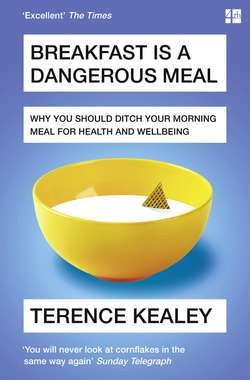Читать книгу Breakfast is a Dangerous Meal: Why You Should Ditch Your Morning Meal For Health and Wellbeing - Terence Kealey, Terence Kealey - Страница 16
Оглавление5
Myth No. 2: Breakfast is good for the brain
Really? It is widely supposed that children and adolescents must do better at school, cognition-wise, if they eat breakfast, yet the conclusions of the most systematic reviews of the field are surprisingly tentative. So two comprehensive reviews of forty-five studies conducted between 1950 and 2008 concluded that eating breakfast seems to benefit the education only of children from deprived homes – and not necessarily because their brains need the morning calories but perhaps because children from deprived homes, on being lured to school by free food programmes, cannot then truant.1
If the evidence for breakfast benefiting the cognition of children is weak, it is even weaker for adults. In 1992 a study from the Department of Psychology, Cardiff University, Wales, found that, though breakfast seemed to improve adults’ morning ‘recognition memory’ and ‘logical reasoning’, it impaired their afternoon ‘semantic processing’.2 In 1994 the Cardiff psychologists found that breakfast improved ‘free recall’ and ‘recognition memory’, had no effect on ‘semantic memory’, but impaired ‘logical reasoning’.3
So eating breakfast seems to improve some aspects of brain function yet impair others, and the general lack of certainty over what – if anything – breakfast does systematically to brain function was revealed by a 2014 review of the fifteen most careful research papers in children and adults which concluded that: ‘There is insufficient quantity and consistency among studies to draw firm conclusions.’4
But researchers need not be restricted to merely observing populations, they can also do experiments, and in 2014 a group from Utrecht, in the Netherlands, published a paper with the exciting title of ‘Always gamble on an empty stomach: hunger is associated with advantageous decision making’.5 Using the Iowa Gambling Task as a model for ‘complex decision tasks with uncertain outcomes’, the Utrecht team found that, when thirty university students skipped breakfast, they performed better in standard psychological tests that modelled decision-making and risk-taking. Leaders, the paper concluded, should skip breakfast.
Free school breakfasts
The first free school breakfasts were served by the School Funds Societies in Paris in 1867, and by 1890 a free breakfast programme in Birmingham, England, was providing children with ‘a substantial hunk of bread and a cup of warm milk’ before the first class. By the 1920s Norwegian schoolchildren were enjoying the Oslo Breakfast of rye biscuit, brown bread, butter or margarine fortified with vitamins, whey cheese, cod liver oil paste, a generous bottle of milk, raw carrot, an apple and half an orange, and by the twenties such government largesse was becoming typical throughout Europe.
The USA, though, remained committed to laissez-faire, private philanthropy and states’ rights, and these seem to have worked well: ‘as early as 1905 charitable religious foundations began offering free breakfasts in churches to needy schoolchildren.’6 The inspirer of these initiatives was the journalist Albert Shaw, who in 1891 claimed with no evidence that ‘to drive children into school to fill their heads when they have nothing in their stomachs is like pouring water into a sieve.’7 The federal government eventually sought permanent congressional authorisation for its School Breakfast Program only as late as 1975, not because the contemporary providers had failed but, rather, because their actions – and one initiative in particular – had proved too successful.
By 1970, though it had been launched only two years earlier, the Black Panther Party’s ‘Free Children’s Breakfast Program’ was feeding thousands of African-American children in church kitchens. It was also using those breakfasts to teach the Panthers’ view of black history. As Huey Newton and Nik Heynen have argued, it was not its militancy but, rather, the success of its breakfast-time educational programmes that led J. Edgar Hoover to declare that ‘the Black Panther Party, without question, represents the greatest threat to the internal security of the country.’8 To crowd out the party’s educational programmes, the federal government understood it first had to crowd out its free eggs, bacon, grits, toast and orange juice.
